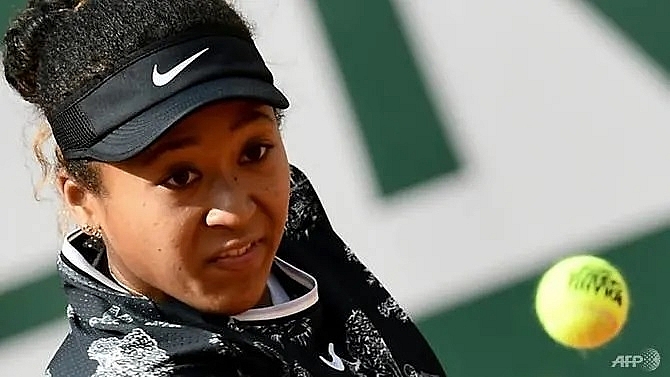Pressure off as Osaka hopes for better Wimbledon fortune
 |
| Eye on the prize: Naomi Osaka. (File photo: AFP/Philippe Lopez) |
The 21-year-old Japanese star saw her hopes of a third consecutive Grand Slam title end in a dispiriting third round exit at Roland Garros.
She admitted that loss to Katerina Siniakova, ranked 42 at the time, was "the best thing that could have happened" for a player so uncomfortable in the spotlight.
Since then, she has lost her top ranking and will head into Wimbledon next week seeded at number two.
Osaka could not be more thrilled.
"During my entire clay season, it kind of mattered and it showed because I was kind of stressed out the entire time," she said when asked about the intense scrutiny which came with being the world's top player who was hunting a Paris title to add to her US and Australian Open crowns.
"Now, I'm just kind of having fun. I'm kind of chilling."
At the French Open, Osaka complained that the pressures she faced were causing her to suffer constant headaches, stress and fatigue.
However, when the Wimbledon draw is made on Friday (Jun 28), more headaches could be on the way.
Her last two trips to the All England Club have ended in back-to-back third round losses against players at ease on grass courts.
In 2017, she was defeated by five-time champion Venus Williams who went on to reach the final.
Last year, she fell to eventual champion Angelique Kerber with Osaka collecting just six games against the German on Centre Court.
Osaka has just one win on grass this summer although she did make the semi-finals in Nottingham last year, losing to Ashleigh Barty, the Australian who has since taken her world top ranking.
"You know, grass, I'm not really that comfortable with it," admitted Osaka, who said the challenges left her "screaming inside" during her win in Birmingham against Maria Sakkari last week.
"It's just really different to everything I have played on. As a little kid, I never played on grass."
It has been a roller-coaster first half of 2019 for Osaka.
Since winning the Australian Open, she split with coach Sascha Bajin and has yet to make another final.
However, she has powerful support in the shape of 20-time major winner Federer who faced similar bouts of fluctuating form and self-doubt in his early years, especially after winning a first Slam at Wimbledon in 2003.
"After that I also didn't win everything. From having nothing to lose it suddenly changes, everyone now feels like it's an amazing win to beat you," said the eight-time Wimbledon champion.
"She has a head start with her two Grand Slams. Now she's done it, she knows she can do it again. I think she's doing pretty well. You can't win every week, nobody does that."
What the stars mean:
★ Poor ★ ★ Promising ★★★ Good ★★★★ Very good ★★★★★ Exceptional
Related Contents
Latest News
More News
- Muong Thanh Golf Club marks five years with flagship golf tournament (October 01, 2025 | 18:25)
- TCP Vietnam opens new youth sports yard in Danang (September 22, 2025 | 18:46)
- 'Run For The Heart' to return to Ho Chi Minh City this September (August 29, 2025 | 15:31)
- LION Championship 25 to feature title showdowns in Khanh Hoa (August 15, 2025 | 14:24)
- AFF Women’s Championship 2025: Vietnam defeat Thailand in tense showdown (August 15, 2025 | 14:21)
- Hung Yen win National U11 Football Championship – Nestlé MILO Cup 2025 (August 06, 2025 | 11:34)
- Vietnam win third consecutive ASEAN U-23 title (July 30, 2025 | 07:00)
- Game-changing tech and startups to star at Vietnam Sport Show (July 18, 2025 | 14:56)
- Vietnam women's team secure 6-0 victory over UAE in Asian Cup qualifiers (July 04, 2025 | 15:32)
- Herbalife Vietnam supports VnExpress Marathon Quy Nhon 2025 (June 17, 2025 | 17:38)

 Tag:
Tag:




















 Mobile Version
Mobile Version